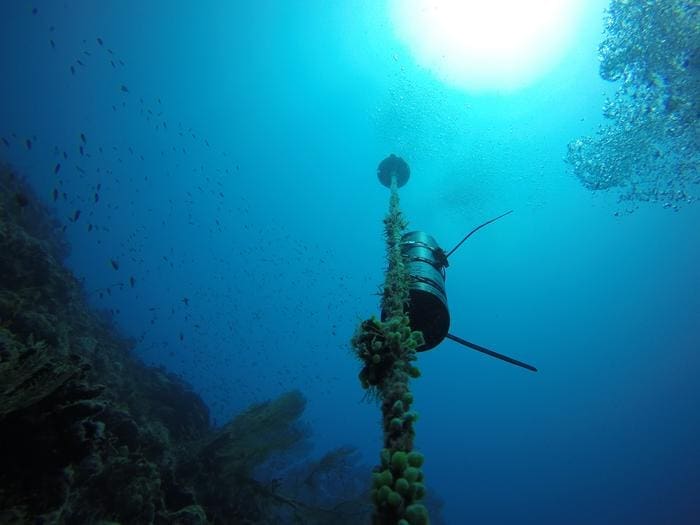Grey reef sharks are being forced to abandon coral reefs due to rising ocean temperatures, according to new research.
The study, published in Communications Biology, reveals that sharks are leaving their coral reef habitats when environmental stressors, such as high temperatures leading to coral bleaching, intensify.
The research, led by marine scientists at Lancaster University and ZSL (Zoological Society of London), used satellite remote sensing and a network of acoustic receivers on the seabed to monitor shark movements at reefs in the Indian Ocean between 2013 and 2020.

The team found that under stress, sharks, which typically remain attached to shallow reef habitats, exhibited changes such as lower residency, more frequent movements, and prolonged absences.
Dr. David Jacoby from Lancaster University, the project’s principal investigator, explained: “These results provide some of the first evidence of how reef change in response to environmental stress, something that is becoming both more extreme and more frequent, is affecting the movement of sharks.”
Grey reef sharks, which usually thrive in Indo-Pacific reefs, now face the dilemma of either leaving these stressed environments or staying in suboptimal conditions. Jacoby warned: “We think many are choosing to move into offshore, deeper, and cooler waters, which is concerning. Many reefs around the globe have already seen significant declines in sharks due to exploitation and this finding has the potential to exacerbate these trends.”
The research was conducted across coral atolls in the Indian Ocean and involved tracking more than 120 sharks using acoustic tags. More than 714,000 detections were recorded and analyzed in conjunction with satellite data measuring reef stress indicators, particularly during the extreme 2015-2016 El Niño event that caused widespread bleaching in the region.
While the exact mechanisms behind the sharks’ behavior remain uncertain, Dr. Michael Williamson from ZSL’s Institute of Zoology, the study’s lead author, pointed out that water temperature is a likely driver.
“Sharks are ectotherms – cold-blooded animals whose body temperature is regulated by their external environment,” Williamson said. “Reef sharks in other regions exhibit behavioural thermoregulation to avoid physiological damage from adverse water temperatures, and this is one of the potential drivers of the findings in this study.”
The displacement of these sharks poses significant risks for reef ecosystems. Grey reef sharks, as apex predators, play a critical role in maintaining balance in coral reef food webs. “A loss of sharks, and the nutrients they bring, could affect the resilience of reefs during periods of high environmental stress,” Williamson noted.
The study offers a glimmer of hope, as not all coral reefs in the study experienced declines in shark residency. Some areas saw an increase in shark presence, suggesting localized factors may be influencing shark behavior and that some reefs may be more resilient to stress.
Dr. Jacoby emphasized the need for further research to understand what drives shark decision-making in these stressful environments. “The implications of this are not yet fully understood but given the complex balance of species and trophic interactions that occur on coral reefs, there will certainly be substantial changes,” Jacoby concluded.
This research, supported by the Bertarelli Foundation, underscores the growing impact of climate change on marine ecosystems, warning of the complex challenges posed by frequent and severe environmental stress events.
Journal Reference:
Williamson, M.J., Tebbs, E.J., Curnick, D.J. et al. ‘Environmental stress reduces shark residency to coral reefs’, Communications Biology 7, 1018 (2024). DOI: 10.1038/s42003-024-06707-3
Article Source:
Press Release/Material by Lancaster University
Featured image: Grey reef sharks and colorful schools of anthias in the waters of Jarvis Island, Pacific Remote Island Areas Marine National Monument. Credit: Kelvin Gorospe | NOAA’s National Ocean Service | CC BY 2.0




